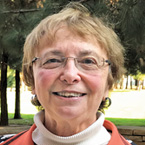
Zena Werb, PhD, an internationally renowned cell biologist and a Fellow of the AACR Academy, died June 16, 2020, at the age of 75.
Werb was born in the Bergen-Belsen concentration camp in Germany in March 1945. Her parents had been forced to separate during World War II, but after reuniting, they moved to Canada in 1948.
Werb earned a bachelor’s degree from the University of Toronto and a PhD in cell biology from Rockefeller University in New York City. She conducted postdoctoral research at Strangeways Research Laboratory in Cambridge, United Kingdom. There, she began studying the extracellular matrix, which would provide the foundation for groundbreaking discoveries throughout the course of her career, based on the idea that cells are influenced by their environment.
After completing her postdoctoral research, Werb taught briefly at Dartmouth, then launched her own lab at the University of California, San Francisco (UCSF). She would spend the rest of her career there, most recently as professor and vice-chair in the Department of Anatomy. She was also the associate director for Basic Science at the UCSF Helen Diller Family Comprehensive Cancer Center.
Much of Werb’s research focused on matrix metalloproteinases (MMPs), enzymes that are upregulated in epithelial cancer and play important roles in the extracellular matrix. She established that MMPs are produced by fibroblasts. Later, her work led to the groundbreaking discovery that integrin proteins, originally thought to possess a primarily structural role, are also able to regulate MMP gene expression.
Over time, Werb focused her research on MMPs and the extracellular environment of breast cancer. Often working in conjunction with Mina J. Bissell, PhD, Werb elucidated the role of MMPs, establishing that they can promote tumor formation and drive malignancy. This work greatly improved the understanding of mammary gland development, as well as breast cancer progression and metastasis.
Werb also helped establish the connection between inflammation and cancer, working closely with Lisa M. Coussens, PhD, who conducted research at UCSF before joining Oregon Health & Science University. Werb became a mentor to Coussens, and together they published a review on the role of inflammation in tumor progression that has been cited more than 10,000 times. Werb was highly regarded as a mentor to early-career scientists, having trained more than 70 students and postdoctoral fellows.
Werb became a member of the AACR in 2001, and served on the AACR Board of Directors from 2003 to 2006. She was inducted as a Fellow of the AACR Academy in 2019. During her tenure as an AACR member, she participated on numerous AACR committees and spoke at various conferences, events, and professional advancement programs. She was a member of AACR’s Women in Cancer Research membership group and the Tumor Microenvironment Working Group. She also served on the editorial boards of Cancer Research and Clinical Cancer Research.
Among many career honors, Werb received the AACR-WICR Charlotte Friend Lectureship in 2001 and the AACR Distinguished Lectureship in Breast Cancer Research in 2018.
She also won the R.R. Bensley Memorial Award and Lecture from the American Association of Anatomists, a Lifetime Achievement in Mentoring Award from UCSF, the Colin Thomson Memorial Medal from the Association for International Cancer Research, the Humboldt Research Award from the Alexander von Humboldt Foundation, and the Federation of American Societies for Experimental Biology Excellence in Science Award. She was an elected member of the National Academy of Medicine and the National Academy of Sciences, and an elected fellow of the American Academy of Arts and Sciences and the American Association for the Advancement of Science.
Werb was a past president and an inaugural fellow of the American Society for Cell Biology, which also honored her with the WICB Senior Leadership Award and the E.B. Wilson Medal.
“Zena Werb built an extraordinary career in the field of tumor biology. Because of her tenacity, brilliance, and passion for science, we now have a greater understanding of the biology of normal and pathological tissues, in particular, normal breast development, breast cancer, and the epithelial microenvironment,” said Margaret Foti, PhD, MD (hc), chief executive officer of the AACR. “She will be warmly remembered not only for her influential research, but also for her dedicated mentorship of many outstanding early-career cancer researchers.”
Zena was a long time colleague and friend and will be sorely missed. Our laboratories often worked in parallel studying mammary gland development and breast cancer. Zena's laboratory set the standard for innovative research in the field. Several of our trainees went to Zena's laboratory and she sent one of hers to BCM. We would often see each other at yearly Mammary Gland GRC and AACR meetings. My deepest condolences to her family in Canada.
Zena was an amazing scientist and inspirational faculty member at UCSF. One of the few people that continued to build hypotheses around the "how and why" cancer happens.